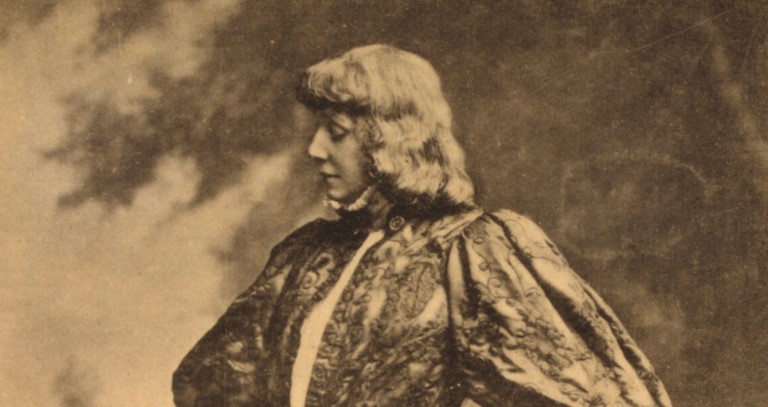2019-2020 News and Reviews
The Shakespeare Society, September 19th 2019
Review by Julia Pirie
The 2019-2020 session opened with the traditional ‘President’s Talk’. The title this year was ‘A Lass Unparallel’d: Shakespeare’s strong women and the question of gender-neutral casting.’ In David Dunford’s absence, this was read – and extracts from the plays performed - by the Vice President and his wife.
The lecture started by addressing today’s concern with gender-neutral casting. The RSC and other companies are currently much exercised by this notion. Men and women feature in all Shakespeare’s plays. Elizabethan and Jacobean companies were all male, though many of Shakespeare’s ‘heroines’ disguise themselves as men, requiring perhaps less dressing up in petticoats and coconuts.

The King’s Men performing in Nottingham between 1614-1615
Amateur dramatic companies (which often include many more women than men in their membership) and single-sex schools/colleges have always had to cope with this issue. I was a secondary school drama teacher involved with school plays. David’s told us about one of his (male) pupils whom he cast as Juliet. At the end of the performance a parent asked him where he had found the girl; she was such a convincing Juliet. It’s easy in a single sex school; one merely casts the best actors.
David touched on other problems facing directors and actors today – particularly perceptions about race, disability and transgender. Who should be cast in these roles? Who should act these characters? He gave the example of Scarlett Johansson pulling out of playing a transgender person because critics felt a ciswoman, couldn’t/shouldn’t (I can’t remember which it was) portray a transgender person in a biopic. Similarly there has recently been some concern about able-bodied actors playing disabled characters. More optimistically for blind, deaf and dumb actors there have been more openings. (It worked brilliantly, I thought, with Charlotte Arrowsmith as Cassandra in the RSC’s Troilus and Cressida last season). But who should be cast as Shylock or Jessica or Othello? It all rather boiled down to “What is an actor?” and that was left for perhaps future discussion.
David’s main concern was the effect of gender-neutral casting in Shakespeare productions. Examples were largely taken from this RSC season. There seemed to be two issues here. On the one hand, the concern to balance the cast gender ratio leads directors to cast women in the roles of orginal male characters (and, though less often, the reverse). This is simple gender-reversal. It’s a way of employing more females in a production. As an example he cited the successful casting of a female to play Agrippa as a woman in the RSC’s 2019 production of Anthony and Cleopatra. The name, Agrippa, he pointed out, could already be a feminine proper noun and contemporary audiences are comfortable with the concept of a female naval officer. Females playing male roles as they were originally conceived is another way to bring women on side in professional as well as amateur theatre. It’s not a new idea: Sarah Bernhardt played Hamlet in 1899.

Sarah Bernhardt as Hamlet
However, deliberately transposing male characters into female ones (and vice versa) affects the play at a much deeper level. The allows the director and cast to tinker (my word) with the play’s traditionally perceived message in an attempt to bring it up to date for a contemporary audience.
In this season’s Shrew a man is cast as Katherine, the older son of Mrs Baptista Minola while Petruchia is the one after the money and the girl. David was less sure of how this worked than he was of the casting of females as Escalus and the Provost in Measure for Measure. From here the talk went on to look at the strength, particularly the moral strength, of Shakespeare’s female characters. Among others, David made a case for Hero, and, I thought, a better one, for Hermione.
He ended with Cleopatra that ‘lass unparallel’d’ whom he felt is the ‘greatest female character’. He made the point that although she deceives Anthony many times, including with the false report of her death, in the end it is this death and the manner in which she faces it which elevates her in the audience’s esteem.

Cleopatra
Some good discussion followed the talk with people sharing their feelings about gender-neutral casting in particular. Not everyone had seen the same productions but both successful and less successful instances were quoted. Someone pointed out that Shakespeare’s work has inspired generations of theatre - goers. His ideas are timeless. His work is robust enough to survive experiments with political and aesthetic readings which echo contemporary issues. However, there was certainly a consensus that, above all, audiences need talented actors who can deliver his poetry authoritatively and audibly.
NOTE
The RSC’s As You Like It, The Taming of the Shrew and Measure for Measure are on at The Theatre Royal, Nottingham during March 2020.